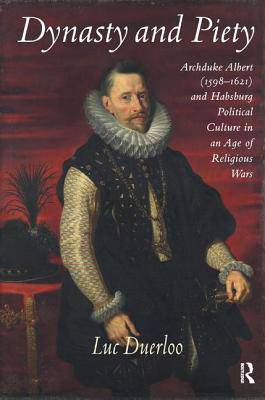
- Afhalen na 1 uur in een winkel met voorraad
- Gratis thuislevering in België vanaf € 30
- Ruim aanbod met 7 miljoen producten
- Afhalen na 1 uur in een winkel met voorraad
- Gratis thuislevering in België vanaf € 30
- Ruim aanbod met 7 miljoen producten
Zoeken
Dynasty and Piety
Archduke Albert (1598-1621) and Habsburg Political Culture in an Age of Religious Wars
Luc Duerloo
Hardcover | Engels
€ 202,95
+ 405 punten
Uitvoering
Omschrijving
The youngest son of Emperor Maximilian II, and nephew of Philip II of Spain, Archduke Albert (1559-1621) was originally destined for the church. However, dynastic imperatives decided otherwise and in 1598, upon his marriage to Philip's daughter, the Infanta Isabella Clara Eugenia, he found himself ruler of the Habsburg Netherlands, one of the most dynamic yet politically unstable territories in early-modern Europe. Through an investigation of Albert's reign, this book offers a new and fuller understanding of international events of the time, and the Habsburg role in them. Drawing on a wide range of archival and visual material, the resulting study of Habsburg political culture demonstrates the large degree of autonomy enjoyed by the archducal regime, which allowed Albert and his entourage to exert a decisive influence on several crucial events: preparing the ground for the Anglo-Spanish peace of 1604 by the immediate recognition of King James, clearing the way for the Twelve Years' Truce by conditionally accepting the independence of the United Provinces, reasserting Habsburg influence in the Rhineland by the armed intervention of 1614 and devising the terms of the Oñate Treaty of 1617. In doing so the book shows how they sought to initiate a realistic policy of consolidation benefiting the Spanish Monarchy and the House of Habsburg. Whilst previous work on the subject has tended to concentrate on either the relationship between Spain and the Netherlands or between Spain and the Empire, this book offers a far deeper and much more nuanced insight in how the House of Habsburg functioned as a dynasty during these critical years of increasing religious tensions. Based on extensive research in the archives left by the archducal regime and its diplomatic partners or rivals, it bridges the gap between the reigns of Philip II and Philip IV and puts research into the period onto a fascinating new basis.
Specificaties
Betrokkenen
- Auteur(s):
- Uitgeverij:
Inhoud
- Aantal bladzijden:
- 610
- Taal:
- Engels
Eigenschappen
- Productcode (EAN):
- 9780754669043
- Verschijningsdatum:
- 28/03/2012
- Uitvoering:
- Hardcover
- Formaat:
- Genaaid
- Afmetingen:
- 156 mm x 234 mm
- Gewicht:
- 1034 g

Alleen bij Standaard Boekhandel
+ 405 punten op je klantenkaart van Standaard Boekhandel
Beoordelingen
We publiceren alleen reviews die voldoen aan de voorwaarden voor reviews. Bekijk onze voorwaarden voor reviews.











